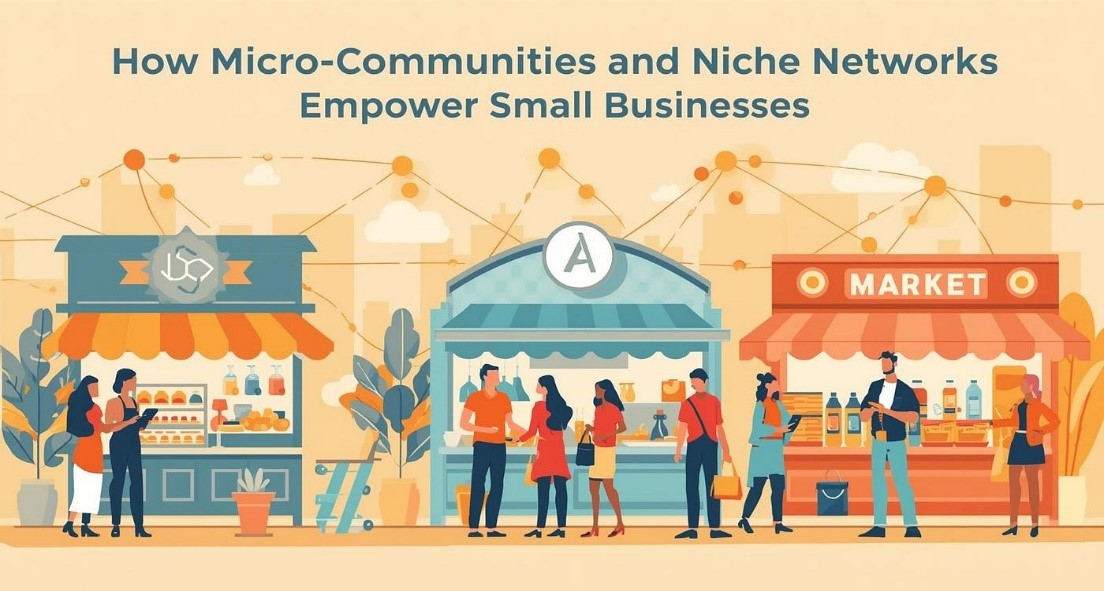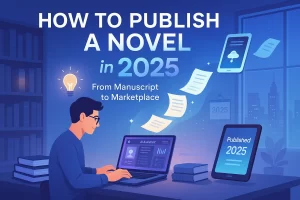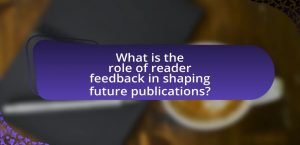The best selling book of Mark Manson, The Subtle Art of Not Giving a F or Fourth Wing, entices many readers not due to its plot, theme, or characters. Instead, the manuscript gained popularity as potential readers shared their positive reviews and opinions with niche groups. The audience promotes the book on social media platforms like BookTok by sharing engaging social media posts, videos, excerpts, and quotes from the narrative. Book recommendations by a passionate audience to a small, focused group are more influential than mass advertising.
So, whether you are a self-published author or a publisher, planning to market your printed and e-books in today’s hyper-connected digital landscape. You are required to shift your focus from broad audiences to increased collaboration with specific, engaged groups of readers. Instead of spending large budgets on initiating a broad marketing campaign, you should invest your time and effort in building a deeper connection with specific niche groups of audiences.
If you have been involved in traditional publishing before, you must have launched broad targeted campaigns on mass media, social media, and other platforms. The campaigns involve allocating a large budget to run promotional activities and also paying huge, upfront investments to launch marketing campaigns.
The rise of micro-communities has significantly benefited publishers, allowing them to adopt a customer-oriented approach. Traditional publishers have now transformed their marketing approaches by employing their powerful word-of-mouth promotion. They no longer need to invest in expensive, broad manuscript marketing campaigns; conversely, the publishers foster a thriving micro-community by cultivating genuine relationships and promoting deeper engagement.
The power of targeted, niche marketing communities has changed passive customers into active participants, reflecting their sense of belonging, recognition, values, and shared experiences with the published manuscript. According to recent statistics provided by Pew Research / BookNet Canada (January 2025) states that around 1,211 Canadians, teenagers, and adults either read printed or digital books or listened to an audiobook in the past year. Half of U.S. adults (53%) use social media platforms such as Facebook, YouTube, Instagram, TikTok, and Reddit to remain abreast with new releases. The online readers using digital sources such as Discord servers, Facebook groups, and community workshops develop a strong, meaningful brand relationship with literary communities.
Understanding the Power of Micro Communities Ignite Curiosity in Readers
Micro-community marketing is considered a major driver of the word-of-mouth economy. They comprise dominant networks that drive book sales and build long-term readership. Instead of crafting a broad marketing campaign for a massive audience, a small, niche group of passionate and dedicated readers adopts a focused approach that involves promoting the book with a specific group of readers having similar interests in the book’s specific topic, theme, or genre. The influential groups include fantasy lovers, mindfulness readers, and Afro-futurism fans get involved with different types of micro community marketing activities. It includes organizing Discord servers, Q/A sessions with Facebook groups, and branded forums or community workshops that enable potential readers to interact with like-minded fans and book lovers. They share their book blogs, reviews, and other marketing content with specialized social media groups.
Nurturing Various Forms of Micro communities through Engagement
Let’s suppose you are an inexperienced publisher or author, facing book marketing hazards. In such a case, you may approach professional book publishing services that assist self-publishers with micro-community marketing. Experienced marketing experts help publishers to research the online platforms where the book’s niche audience spends time online. They provide promotional tactics to identify the targeted readers’ communities on online forums, social media groups, and podcasts.
Passionate readers may form a BookTok fantasy niche, a micro-community on TikTok. Comprising book lovers, authors, publishers, and the literary community, the influential BookTok network incentivizes niche groups with personal recommendations and marketing initiatives.
Cozy Mystery Facebook group includes numerous groups on Facebook that enjoy reading cozy mystery novels. The community of readers, writers, and authors discusses the essential aspects of the book, along with sending endorsements to a vast audience to read the book. Cozy mystery friends, mystery club, book society, and readers’ tribe include book fans who interact in a relaxed and friendly environment. The group members share their favorite genre of books and discuss new releases. Moreover, the groups help readers to discover new books and authors.
Online forums, communities, and social media fans establish LGBTQ+ speculative fiction forums on Reddit, Facebook, and Goodreads. These online forums discuss the significant aspects of the book, craft early reviews, and send personal referrals that buzz around the upcoming book.
Professional marketers further assist the author’s community to find their niche community of readers through in-person groups comprising local book clubs, library groups, or historical societies. The readers interact with their peers within their groups, sharing specific interests, and their reading experience through collaboration and engagement. The publishing services assist authors in creating engaging materials such as blog posts, videos, and podcasts that increase follower count, boost engagement, and conversion rates.
How Niche Marketing Has Transformed the Publishing Landscape
To transform your traditional marketing into a vibrant and cost-effective pathway of modern book marketing implies that new authors analyze traditional publishing vs self-publishing marketing strategies. Traditional marketing involves broadcast advertising. The marketers launch traditional blanket public relations campaigns on electronic and print media. The PR campaign comprises reading copies (ARCs), newsletters, blogs, and press releases that are propagated to a broad network of journalists, bloggers, influencers, and reviewers before the book’s launch. The engaging content, such as blogs and reviews, highlights emotional storytelling, mirrors the author’s life events, emotional struggles, and triumphs that lead to an impactful marketing campaign. Personalized newsletters having key quotes, excerpts, or poignant moments from the narrative inspire new readers and increase reader engagement and retention. The paid media placement includes a variety of video ads, influencer sponsorships, native advertising, and affiliate marketing.
Niche community marketing has democratized the industry by allowing smaller publishers and independent authors to bypass traditional gatekeepers. Instead of launching a broad, mass-market campaign, motivated reader groups articulate the unique value and brand goals by initiating a community engagement strategy that helps other community readers know why the book is a perfect read for them.
Micro-communities help independent authors and publishers to build stronger, direct relationships with a specific group of readers through online platforms, social media, and newsletters. Authors also connect with their fans on forums and through professional book writing services. By interacting with specialized communities of readers, the authors propagate a concise, personalized message that expounds the significance of reading the book for a diverse genre of readers and further tempts them to instantly purchase their personal copy.
For instance, you might have heard about Colleen Hoover’s success on TikTok. It was not driven by the book cover, theme, or characters. Conversely, the book gained popularity due to the organic growth of the #BookTok community. Hoover made a loyal following on TikTok, Facebook and Instagram. The active engagement of readers in the form of word-of-mouth marketing inspired other readers. Sharing their comments, blogs, and reviews on social media and meeting fans in person helps a new audience discover the book. Similarly, another bestseller author, Andy Weir, created a passionate fan base who propelled the novel, The Martian, among niche communities through science fiction forums and personal blogs.
Identifying Your Book’s Core Niche & Reader Persona
To effectively market the book to micro-communities and niches, self-published authors and publishers are required to know their book’s core niche and reader persona. Indie authors should find a specialized audience who have interests in the genre and themes of their published books. It includes surfing online forums, book clubs, genre-specific Facebook groups, and other social media channels. Publishers engage in genre-specific online communities and use social media to analyze readers’ perception, trends, and purchasing power. Furthermore, renowned book publishing services such as David McKay Publications facilitate new authors in identifying niche platforms to build a strong connection with a specific audience. The marketing experts at book publishing services conduct market research, analyze changing market trends, and perform an in-depth review of the manuscript. The survey allows authors to know the audience’s education and profession. Understanding psychographics helps them know the viewers’ choices, interests, favorite authors, genres, and themes they are fond of reading. The other relevant information includes buying habits and the online sources employed by the reader community for new book discoverability.
Publishing experts allow authors to define their specific genre and sub-genre and analyze the tone, style, and theme of the book. Some authors use cross-genre elements in their books. It includes blending historical fiction with romance or YA dystopian romance with environmental themes. Going beyond a general genre, along with merging other themes, broadens community readership. The marketing team reviews various aspects of the book, such as the loopholes in content, design, formatting, and layout. Employing industry trends and leveraging digital tools such as Google Trends, BookBub Insights, TikTok analytics, and Amazon category performance, identify the average number of reader reviews, sales revenue, conversion rate, and unique selling proposition (USP) for the author’s book. With professional marketing assistance offered by the David McKay company, the authors reach out to aficionados and supporters on Facebook, Reddit, and Goodreads. Moreover, private Discord servers, specific Facebook groups, BookTok hashtags, and niche newsletters help independent authors to develop a direct and controlled engagement with their most trustworthy audience.
Crafting a Micro-Targeted Book Marketing Strategy
Tailor the Message of your Micromarketing Campaign
To build meaningful relationships between brands and their audiences implies that the publishing house offers an ultimate guide to book marketing to community marketers. The brand growth strategy includes creating a detailed reader persona. Once the author understands the reader’s perception and trends, they determine the book’s positioning in the market. Creating engaging brand messaging allows authors to align their readers’ needs with their unique selling proposition. For instance, cozy mystery readers love to read books on genre-blended themes with historical settings, with fantasy elements, charm, and humor. Dark fantasy novels with intrigue and aesthetics appeal to social media groups.
Micro-communities also create user-generated content such as book reviews, blog posts, discussion posts, and videos that are posted on various review sites, social media, blogs, online ads, and product sites. A sound and impactful micromarketing campaign comprising segmentation and personalization inspires other communities to share their experiences and opinions. By adjusting the tone, language, and visuals, the marketing content builds an initial buzz around online communities, bringing high sales volume after a book’s initial release.
Leverage Niche Influencers
The community-based marketing strategy involves authors collaborating with niche micro-influencers to launch a micromarketing campaign. It involves approaching book bloggers, booktubers, bookstagrammers, and BookTok creators to focus on a specific niche by crafting a personalized pitch. One such example of micro-community marketing on social media is a small fantasy review channel on YouTube that increases brand loyalty and customer retention. Organic advocacy has become a powerful brand advocate that generates buzz around the new publication and brings high followers.
Storytelling Through Authenticity
Brandon Sanderson, a bestselling author, employed authentic storytelling for micro-community marketing of his books. Instead of launching a traditional, mass-market campaign, he developed a highly engaged micro-community of readers. A dedicated online community, the Fantasy subreddit promoted the published book through YouTube, Instagram, and Facebook.
Today, modern writers have become skeptical of traditional advertising and have changed their perspective towards engaging with a niche group of readers through creating a fascinating and compelling concept with their micro-community marketing. The authentic storytelling has become a powerful marketing tool to build highly engaged, niche groups of readers with specific interests and values. The authors build an emotional connection by crafting compelling content that reflects the brand’s true values.
Authentic storytelling by small, focused communities in the form of fan art, reviews, quotes, blog posts, testimonials, and feature stories builds grassroots buzz in niche community readers. Niche communities quickly spot the user-generated content that showcases the real experiences and stories of community members. Moreover, hosting events, Q&A sessions, and podcasts further builds interaction between the author and community readers.
Platforms Where Micro-Communities Thrive
Leverage Micro Community Platforms
Let’s suppose you are a new self-publisher and lack sufficient knowledge of social platforms where micro communities flourish. In such a case, you may seek assistance from book writing services. The marketing team helps you explore micro-community platforms, including Reddit, Discord, Facebook Groups, TikTok (BookTok), Bookstagram, and Slack Communities.
BookTok
The authors are required to choose the platforms that generate high micro-community engagement. Let’s suppose your book fans use TikTok for manuscript marketing, you will notice that BookTok, a micro-community actively participates by creating captivating posts, blogs, or book reviews about the book content and features. They also share the user-generated content with other readers using the hashtag #BookTok. The specific community of readers also shares quotes and excerpts from the fiction that creates a buzz around the new book and helps drive high book sales.
Instagram (Bookstagram)
Bookstagram, a micro-community of a dedicated group of followers, posts genre-specific content on Instagram. A micro-community focuses on a specific aspect of the book and offers a friendlier space for readers to interact and discuss the specific theme, title, or characters in the narrative. Bookstagram is considered a perfect platform for visual branding, allowing community readers to relate their lived experience of reading. The members post visually appealing photos and reels, create engaging posts, along with writing eye-catching captions. The engaging content with relevant and concise hashtags sparks curiosity in other readers to leave thoughtful comments and reviews on the site and connect with other community on a deeper level.
Reddit forms different book-related subreddits. It comprises communities of r/fantasy for fantasy readers and r/Romance books for romantic book fans. Other categories of community include genre-specific communities, r/SuggestMeABook for book recommendations, r/YAlit for young adult readers, and r/horrorlit for avid readers of horror literature. Genre-specific subreddits and other communities serve as powerful community hubs where readers find new titles, connect with the author, and discuss different aspects of the book. Moreover, the community platform also offers experts’ reading tips and recommendations regarding reading a book.
Discord
Many authors create a private reader Discord to interact with the audience and discuss different aspects of the book. The readers with similar reading interests and choices join a private community and chat with other readers in a cordial space. Discord encourages committed micro-communities to build genuine relationships with prospective readers and incentivizes them by offering 20 best gifts for writers, discounts, bonus digital or physical merchandise, pre-order bonuses, and loyalty programs. Dedicated and loyal advocates lead to higher engagement rates and generate more sales than passive followers.
Goodreads & StoryGraph
The Online forums allow a micro community of readers to track and discover new titles. Goodreads comprises a large community of authors and readers who regularly post their comments, views, and book reviews on various genres of books they have read. StoryGraph is a newly formed platform that demonstrates reading statistics of the audience, such as the reading mood, pace, behavior, and habits. The platform matches the books based on readers’ existing trends, perception, pace, and themes. StoryGraph also provides granular star ratings to the book, attracting a specific niche audience to discover the preferred book
Facebook Groups
Facebook groups such as creative freelancers or coffee lovers unite are niche advocacy groups that get connected with groups with shared interests and purpose. The genre-specific niche groups include teenagers and young individuals who facilitate discussion and conversations among like-minded book fans. Hosting live Q&A sessions and posting blog posts, feature articles, and social media posts gets higher organic reach and helps increase the book’s visibility.
Newsletters & Podcasts
To promote a book among a micro community, authors use niche-focused newsletters and podcasts to develop a direct, personal relationship with a proactive community of readers. Through newsletters, community members and subscribers share personal experiences that attract loyal advocates. By hosting a niche podcast, the community readers discuss the specific genre, topic, and theme. An engaging podcast creates in-depth engagement, attracting a dedicated, passionate following.
How Publishers and Authors Can Collaborate with Niche Communities
Effective Strategies for Authors
Professional book publishing services guide authors and publishers to build a lasting relationship with a niche community since the beginning of manuscript production. The beta readers review the preliminary draft and come up with constructive feedback to refine the flow and coherence of the narrative. To increase book discoverability among specific groups of the writing community, the authors are required to actively participate in online forums, Facebook, Reddit, Discord, and book clubs. They conduct in-depth discussions on a book’s specific topic, theme, or genre, arrange A/Q sessions, and organize local meetups, workshops, and conferences. The authors offer advanced reader copies (ARCs) to active community members, motivating them to share thoughtful reviews on Goodreads or Amazon and other forums.
To boost their personalized, cost-effective marketing, the authors leverage influential community members, including book bloggers, Bookstagrammers, and BookTokers. They encourage the communities to participate on Facebook, Instagram, and TikTok, leave their comments and feedback, and post engaging blogs and book reviews. Private micro community groups such as Facebook Groups, Discord, Slack channels, and reader clubs share user-generated content of a niche community of readers. Fans actively participate in Q/A gatherings, engage in collective storytelling, and relate their experiences of how the book significantly impacted their life. With the creation of private forums or groups, the authors get more opportunities to plan joint promotions. It includes sharing testimonials and stories through branded hashtags and organizing different interactive literary campaign activities.
How Publishers Collaborate with Niche Communities
Professional book publishing services can optimize book marketing by partnering with influencers or micro-presses specializing in certain genres. Publishers jointly work with micro-communities on different platforms. Around 1,000 to 100,000 followers within the Bookstagram or BookTube community respond to readers’ feedback and Q&As to create a deeper and longer-lasting engagement. The publishers also promote the book to literary communities by offering advanced reader copies (ARCs) or the final copy of the published book, unique discount codes, and promotional giveaways. It helps in a broader promotion of the book across different niche communities.
The publishers launch marketing campaigns around specific themes or genres. It includes arranging themed virtual events or pop-up book clubs for target readers. Specialized online communities join prominent platforms such as Private Facebook Groups, Discord, and Slack channels to engage authentically in real-time discussions and contribute insights.
To Recapitulate
The era of mass marketing is vanishing; it highlights the significance of employing niche marketing for promoting the book among micro community readers. Hyper-targeted engagement involves specific groups or small, loyal communities with shared values, interests, and purposes who foster a direct, personal relationship with dedicated readers. Thriving with peer-to-peer influence, in-depth discussions, and Q/A sessions, micro communities help boost the marketing of the book across different niche communities. Investing in micro-communities benefits self-publishing authors and publishers in transforming their marketing strategies. Instead of conducting expensive surveys and mass marketing campaigns, the publishers engage with an organic and cost-efficient marketing strategy. Nurturing authentic connections with the microcommunity allows community members to interact on different community platforms such as Reddit, Discord, Facebook Groups, and Slack Communities. Highly motivated reader groups discuss specific aspects of the book, such as the book title, theme, topic, and genre. Moreover, they offer honest and valuable feedback that forms trust-based relationships with the author and further leads to meaningful collaboration and engagement on social platforms.
The authors and publishers have employed strong marketing initiatives to establish long-term engagement with a potential community of readers. For instance, they join online forums, Facebook, Reddit, Discord, and book clubs, and arrange local meetups, motivating passionate reader groups to share their real experiences, reviews, fan art, and testimonials of community members. An authentic form of storytelling that resonates with the audience on an emotional level increases book marketability among other communities. Writers and publishers also collaborate with book bloggers, Bookstagrammers, BookTokers, and keep the viewers updated about new publications. Through social media channels, YouTube, TikTok, and Instagram, the publishers share reviews and engaging visual content that incentivize readers. Conducting literary events such as Q&A sessions, virtual book clubs, live readings, podcasts, themed events, conferences, and seminars enhances a book’s value and relevance among potential readers. Thus, a successful focused niche marketing leads to grassroots engagement and fosters cross-book promotion that expands book reach and sales.




